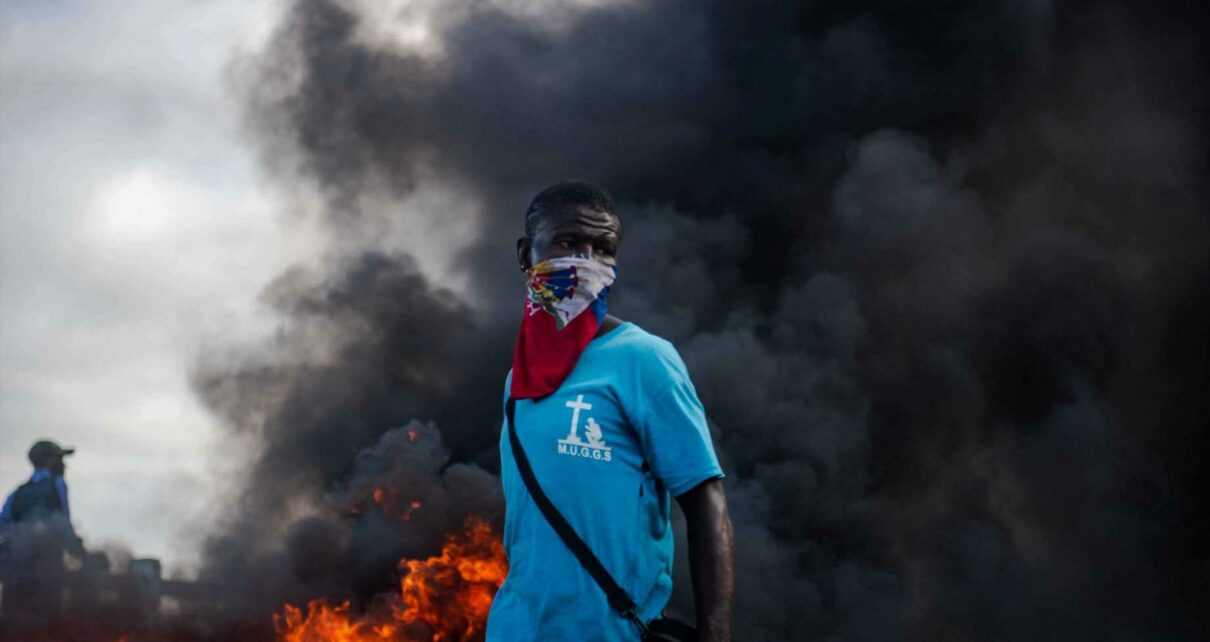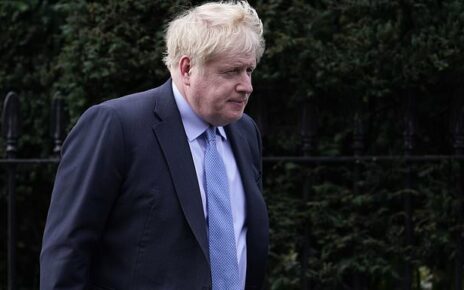SMOULDERING bodies line streets, sniper rounds pound from rooftops, and children scream – Haiti’s capital is under siege by armed gangs, but there’s a new grisly group in town.
The most dangerous city on earth has become even deadlier as vigilantes have taken the law into their own hands to hunt down criminal gangs street-by-street – turning Port-au-Prince into a city in open warfare.






Haiti has long suffered the title of the poorest nation in the western hemisphere, and recently was announced as the hungriest – but it is also racked by vicious bloodshed.
Horrific scenes over the last few months have seen fighting on the streets as gangs clash with the vigilantes – with some of the criminals even being butchered, lynched and burned.
The Caribbean nation is “dangling over an abyss”, according to a human rights chief for the United Nation.
Persistent earthquakes, soaring inflation, famine and a near-total political collapse all plague the city, while machine-gun-wielding gangs continue to terrorise the population – kidnapping, raping, torturing and murdering at random.
read more on Haiti

Inside world’s most dangerous city ruled by gangs & warlord named ‘Barbecue’

See what happened in Haiti today; the aftermath of the 7.2 earthquake that hit
Experts believe these ruthless thugs now control up to 80% of the capital paralysing the city in a violent rage.
The spiralling violence has spilt into previously safer areas in the north as tens of thousands flee further into the hills to escape.
“No area within the capital is now safe from the grip of gangs,” a UN human rights spokesperson told The Sun Online.
“The population is the collateral and increasingly the targeted victim."
Most read in The Sun

Phil Schofield’s Dancing on Ice replacement ‘revealed’ as star wows bosses

Kyle Walker at centre of WAG feud as mothers of his kids clash online

How Adele is at centre of bust-up between Alan Carr & ex after divorce'

Royal couple enjoy snog at boozy Isle of Wight festival shocking onlookers
But a new civilian army has entered into Port-au-Prince’s urban war known as “Bwa Kale” – a grassroots movement borne out of struggle and suffering and intent on inflicting a deadly justice.
It is the newest problem to hit the disaster-struck capital as this vigilante justice movement takes the place of a wounded and depleted law enforcement and powerless state.
The UN reports that there are barely 3,500 “overstretched, underequipped and outnumbered” police officers on patrol across the island nation.
This minimal force is tasked with protecting 11 million people held hostage by over 200 gangs.
In response, civilians fed up of being preyed on by gangs are now hunting their abusers – taking on the thug's military-grade weapons armed with only machetes, knives, rocks and sharpened sticks.
In the early hours of April 24, the new civilian army launched their revenge movement by taking back control of the crime-infested neighbourhood of Canapé-Vert.
They attacked a police bus carrying 13 suspected gangsters, who were dragged out, beaten, lynched then burnt – their charred bodies left on the streets for all to see.
Another force of Bwa Kale simultaneously stormed the same gang’s now less protected stronghold and burnt six suspected criminals alive.
The gruesome incident was filmed on phones and instantly went viral on social media – the spectacle intended to strike fear in the hearts of the organised gangs.
THE 'SECOND REVOLUTION'
It marked the beginning of a new dawn of violence that human rights organisations argue has plunged the city further into instability and lawlessness, while some Haitians argue it is the beginning of radical social uprising.
De facto Prime Minister Ariel Henry has condemned the violence, stating: “The insecurity we experience is appalling,” adding that people should not be dragged “into mindless violence”.
UN General Secretary Antonio Guterres has been busy lobbying neighbouring nations to step forward to lead a new international military force to stabilise this barbarity.
“The current situation in Haiti reflects a threat to the security of the entire region and beyond,” he warned.
According to a report, this “citizen awakening” has led to at least 160 suspected gang members being “chased, lynched and burnt alive” in May, local research group CARDH said.
The human rights NGO also recorded a “drastic reduction” in gang-linked murders following Bwa Kale’s extrajudicial killings – 43 in May, down from 146 in the first three weeks of April.
"Without making a value judgement, the 'Bwa Kale' movement has in just one month produced convincing, visible results; fear has changed sides," CARDH said.
Mercy Corps, a humanitarian agency working to deliver aid under the extreme conditions in the capital, told The Sun Online that the birth a movement like Bwa Kale is "not unique to Haiti".
Country Director for Haiti, Lunise Jules, explained that such vigilantism "would likely occur in any country facing similar challenges."
"Haiti's absence of a functioning justice system has led to institutionalized impunity," she said.
And yet, Jules stressed that: "non-violent citizens are worried because they still don't understand this non-organized movement's goal."





The leaderless and spontaneous movement is slowly spreading nationwide summoning the masses with a war cry of a “second revolution”.
Haiti’s first revolution defeated the French and ended 300 years of colonial rule, which led to the first republic founded by self-liberated slaves.
Entire communities are rising up against gangs. Last week in Latibonit, to the north of Haiti, streams of hundreds of locals including children were seen chanting and hunting gang members supplied with only sticks and a few knives.
They are calling themselves the "people's fight" – carrying out mob justice, sometimes acting alongside the police in a dangerous alliance and identifying their victims with little evidence.
Violence continues to spiral as gangs have sought revenge attacks in response – burning and killing their challengers.
Jeff, a brutal leader of gang in the north of the city dared Bwa Kale to strike again: "We are the Taliban, Team Crime. Here are the beasts.
“All those who are frustrated, bring it on.”
Port-au-Prince local Emmanuel, who has not given his real name due to security reasons, works with the most vulnerable in gang-controlled communities.
“The level of violence is beyond what humans can cope with,” he explained.
“There are times you’re like ‘Okay I can make it’ and the next day you think ‘this is gonna kill all of us’.
“You're afraid every day. You're always wondering if you're next.”
Emmanuel understands the plight of those who no longer want to be at the mercy of gangs.
He said: “A lot of them, that includes children, have witnessed atrocities such as people being murdered in front of them. So there's quite significant trauma in the displaced population, who’ve lost everything they’ve ever had.”
Haiti’s largest newspaper, Haïti Liberté, has hailed Bwa Kale as a means for the country to sort out their own problems without the UN having to send in an international force.
"Haiti has never seen more rapid and effective results," they write.
The paper argues that "an overwhelming majority of Haitians approve," adding that the "gangs have used the very same forms of terror against the defenceless population."
HUNTING GANGS
In Port-au-Prince, factions of Bwa Kale have set their sights on Barbecue, aka Jimmy Cherizier, the leader of the powerful G-9 coalition of allied gangs.
The cop-turned-warlord is rumoured to have earned his nickname for setting his victims on fire and has led a long reign of terror over the poorest areas of the city.
Vigilantes have been screaming “down with Barbecue” and “Barbeque let kids live” in the poverty-crippled shantytown of Cité Soleil, where the nefarious gangster has organised multiple massacres.
How do you prevent this becoming a civil war?
Explaining the success behind Bwa Kale, Emmanuel said: “They are not confronting gang strongholds but strategically identifying weaknesses in the gangs and their informants and taking advantage of those.
“They have successfully disbanded gangs in some areas and put them on the run,” he said, adding that they are managing it simply “armed with anything sharp”.
However, this hunt has included anyone alleged to have fraternised with gangs, including the killing of vulnerable women forced into sexual relationships with them.
“People are afraid,” he warned, “because anyone who's not familiar with the place can be flagged as a potential gang member, and then your fate will be decided right there.”
The NGO worker added: “If the gangs weaken and that movement grows, then this is where you can have a civil war.
"Hundreds or even thousands of people could be lynched if that movement continues."
There is, he said, often a complicated relationship between gangs and the neighbourhoods they control.
In some communities, they have established internal economies, fed the poor and offer protection from rival gangs, leading some Haitians to welcome these structures.
Emmanuel asks what becomes of already suffering people who don't want to pick up arms and don't want any part in the people's "revolution".
Read more on The Sun

I work on a cruise ship, the four easiest jobs if you want to travel for free

Home Bargains shoppers rush to buy summer essential that’s selling for £20
“How do you choose which game you fight in? Or if you're going to fight?
“It's what comes next. That's the big question – how do you prevent this from becoming a civil war, when you don't know who's the good and the bad guy anymore?”


Source: Read Full Article

